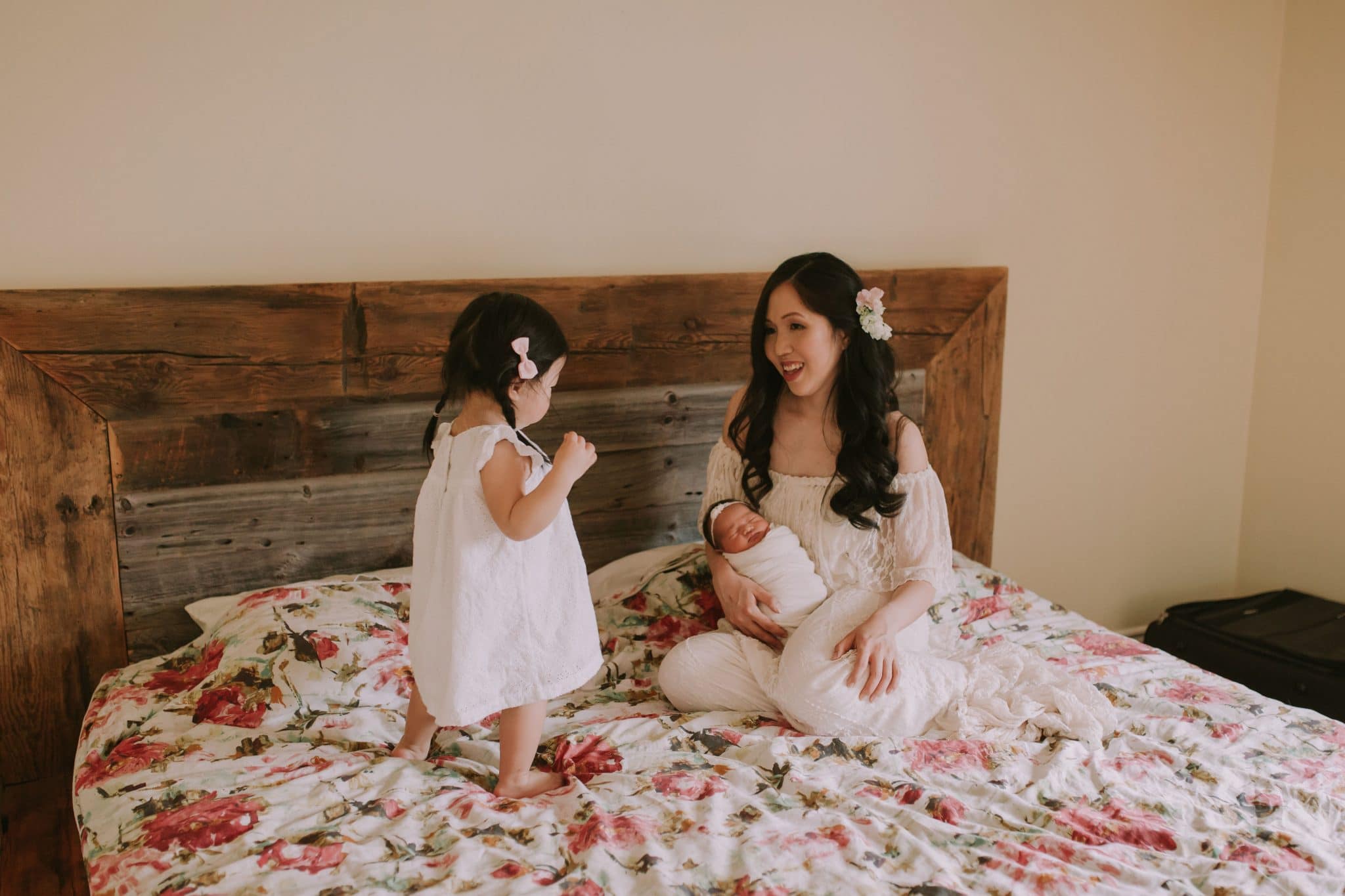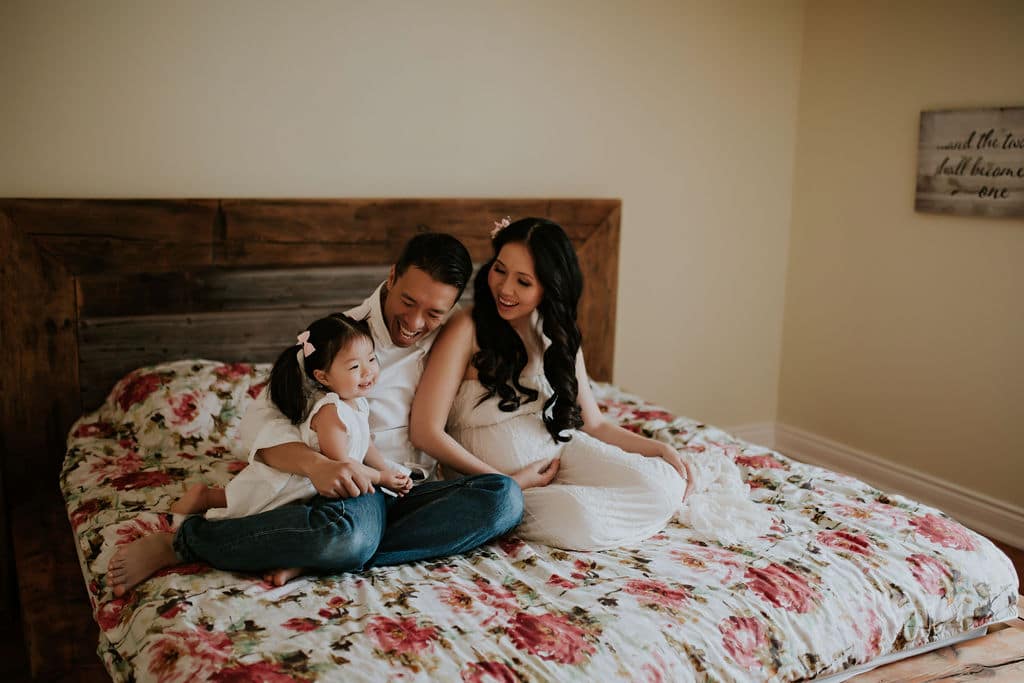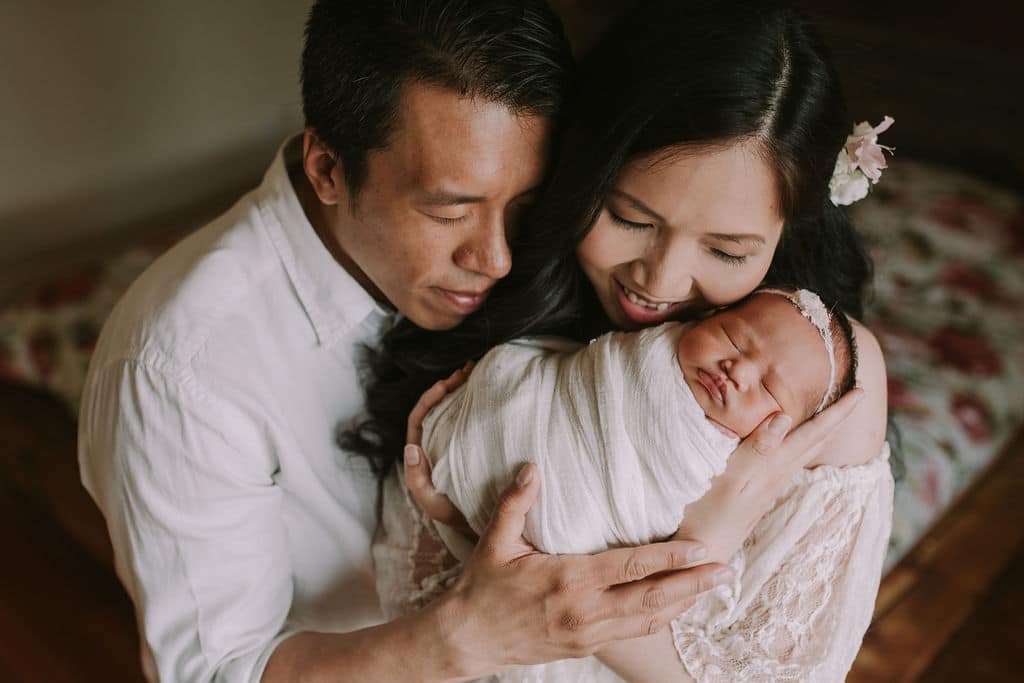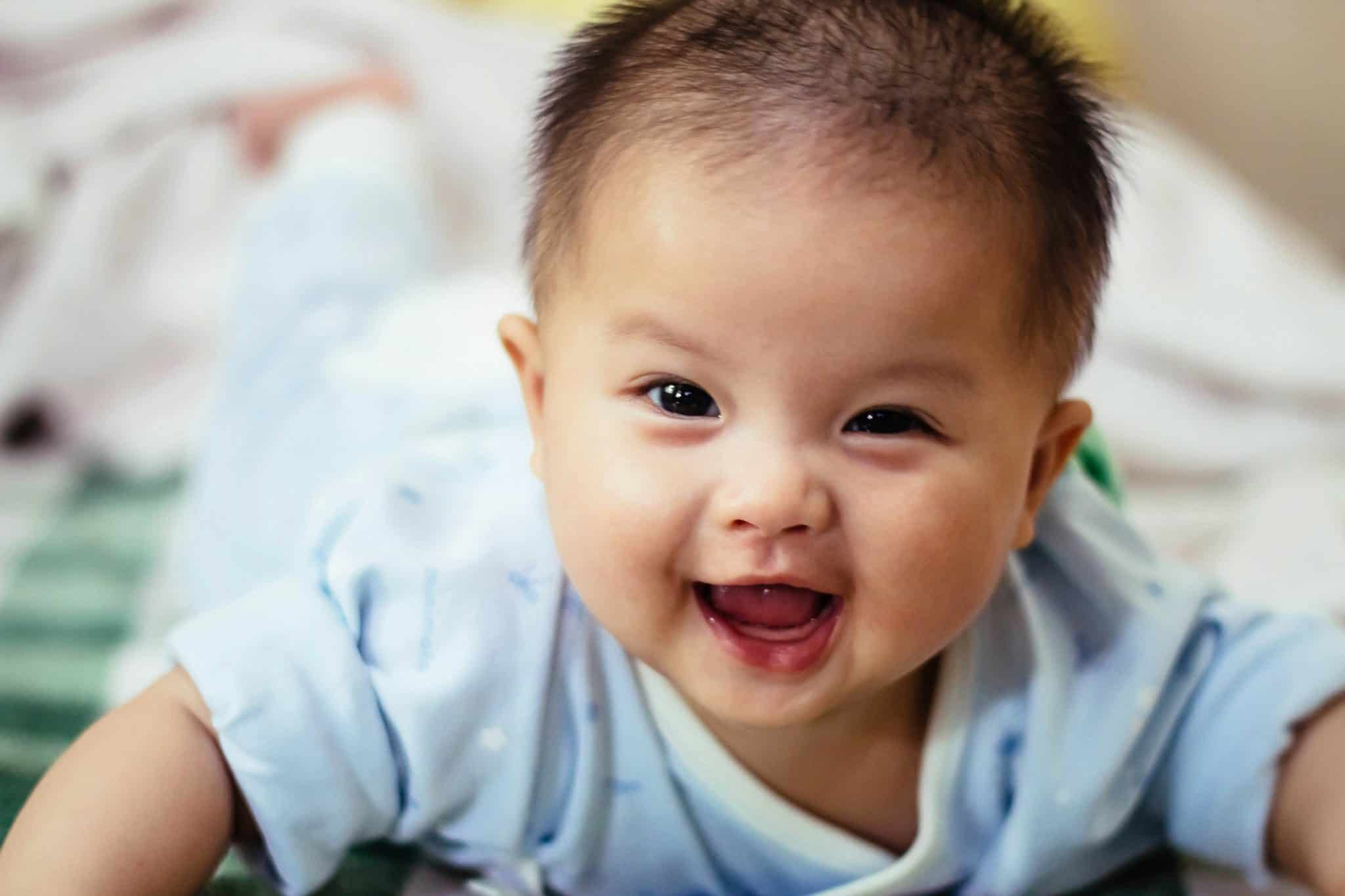Mothers, you are enough
Salt&Light honours all mums and wishes families a Blessed Mother's Day!
Dr Tam Wai Jia // May 6, 2022, 6:03 pm

"Though I was rejected as a girl at birth, He crowned me with the perfect privilege of mothering two girls," says Wai Jia. All photos courtesy of Dr Tam Wai Jia.
I sat in a puddle of tears.
I am failure. I am a disappointment. I am not good enough.
I should have been happy. After all, just a day ago, my second child – a beautiful baby girl – was scooped into my arms in a glorious home birth. But soon after I burst into tears of joy, I fell headlong into months of depression.
As I opened up gifts from our baby shower, I found myself sitting in the middle of a mountain of clothes for a baby boy.
What’s going on? I cried. Tears fell from my face.
An onslaught of memories rushed back.
I too, was a second girl, the last child of the family. While growing up, I was told the story of how the doctor had promised my mother I would be a boy. And how disappointed she was when I was born.
When I discovered I was carrying my first daughter, I shared the news with her gingerly. I remembered the fall in her voice: “It will be a boy in the end, don’t worry.”
I was told the story of how the doctor had promised my mother I would be a boy. And how disappointed she was when I was born.
Two older Christian mentors told me: “You’re carrying a girl because you’re the dominant person in your marriage.”
Bewildered and hurt by the responses of people I loved, I began to believe there was something wrong with me. I was not good enough. Not as a daughter, not as wife, not as a mother-to-be.
In my second pregnancy, we were living overseas. Determined to keep the gender of our second child under wraps, we requested for gender-neutral clothes.
But when majority of the clothes we received were for a baby boy, even in North America outside the traditional Asian context, deep-seated shame storm brewed.
Did having daughters make me a lesser wife and mother? Did people hope for the “best” for me by giving me boy clothes? Does God value me less than other mothers who have boys?
A well-known itinerant preacher had prophesied to me at a conference in America said: “You have a princess. You will next have a prince.” Did I miss the mark?
Like a fleck of dust, I was caught in the eye of a raging shame cyclone.

Little Sarah-Faith waiting for the birth of her sibling.
When I returned to Singapore, my humiliation did not end. Wherever I went with my toddler and newborn, I was at the mercy of taxi drivers, shopkeepers, Christians, too, who said: “It’s okay, you can always try a third time.”
I did not know it then, but shame encased its cold, hard texture around my heart. I withdrew into self-condemnation, convinced deep down that, somehow, God loved me less.
I am not good enough.
Mothers, of all people, struggle hard
As much as we don’t want to admit it, all of us, especially mothers, struggle with shame.
Shame researcher Brene Brown states: “Shame is the intensely painful feeling or experience of believing that we are flawed and therefore unworthy of love and belonging.”
What mothers struggle with is not merely a sense that we did something wrong, but that, deep down, something is wrong with us.
While guilt is feeling bad for something we’ve done wrong, shame is that terrible feeling that we are bad. Guilt may say: “I feel bad for missing out on my child’s sports day due to work.” But shame concludes: “I’m a terrible mom.”
The most common question that many mothers have asked through my Instagram account is: “How do you manage mom-guilt?”
Of late, I have had an epiphany. That often, Mom-guilt is not guilt at all. It’s shame. It’s feeling not-good-enough and unworthy.
I may not be a shame expert, but – having been a stay-at-home-mom (SAHM), full-time then part-time working mum, and fly-off-to-Africa-alone-for-humanitarian-mission mom – I know what “mom-guilt” feels like.
By and large, what many mothers struggle with, more often than we should, is not merely a sense that we did something wrong, but that, deep down, something is wrong with us. We’re not good enough.
If our child has severe allergies, a broken bone, a disability, a mental struggle, a struggling faith, if our marriage experiences troubles, many of us question: Where did I go wrong?
And quickly conclude: I am a bad mom.
Breaking out of the shame
We all know the story of Adam and Eve. Genesis 2:25, the last verse before sin entered the Garden of Eden, states: “And they were both naked, the man and his wife, and were not ashamed.”
Upon eating the fruit of the Tree of the Knowledge of Good and Evil, Adam and Eve discovered their nakedness, clothed themselves, hid, and were then banished from the Garden of Eden.

With our second daughter, Esther-Praise, at birth.
This tells us one thing: In God’s perfect world, we were never meant to bear the burden of shame.
Everything changed in the next verse. Genesis 3:1 tells the story of the serpent: “Now the serpent was more crafty than any of the wild animals the Lord God had made. He said to the woman, ‘Did God really say, ‘You must not eat from any tree in the garden’?”
When we don’t know what God “really says”, we end up believing the lies of the enemy. We end up hiding and making up clothes we don’t need to cover up parts of ourselves we hate.
On Mother’s Day, as we celebrate mothers around the world, my prayer is that God would remind us of the shame He bore for us, so that we can be set free.
If you’re struggling with shame, I hope this guide may encourage you that, Beloved, in Christ, you are good enough.
1. Recognise and confront your shame
Like me, have you too struggled with “identity” issues that challenge your self-worth? We can only confront our shame if we recognise it.
Today, if you are struggling with shame, call it out.
Perhaps an older relative has questioned your ability to be a good mother because you cannot cook. Perhaps you wonder how you can be a good mom because your child was born with a disability, or because you couldn’t breastfeed or have a natural birth. Perhaps you struggle in your marriage. Perhaps you wrestle with never fitting into your pre-pregnancy clothes.
And you conclude you are awful, ugly, unworthy. This is not guilt at work. It’s shame in full force.
Only when I identified my shame could I begin my journey of inner healing and forgiveness.
As I allowed God to reveal to me how my rejection as a girl at birth had impacted me, I could begin my journey of restoration.
Today, if you are struggling with shame, call it out. However painful, embrace it as the start of your healing journey.
2. Challenge your assumptions curiously and compassionately with God’s truth
Shame happens hardest when we make snap-finger conclusions about who we are. If you jump from something you did, or did not do, to labelling your identity and sense of worth, that’s shame.
I snapped at my child, so I am a terrible parent. I can’t fit into my old clothes anymore, I am so ugly.
We’ve all been through these thought-spirals.
Putting a distance between what happened and our conclusions becomes easier when we challenge our assumptions.
Just as we would to a dear friend whom we love, we can ask ourselves curious and compassionate questions: What led me to this conclusion? What do I believe? Is this true? Why do I believe this?
Others’ disdain of me did not diminish my worth to God.
As I went through a period of deep soul-searching, inner healing and Bible study, I realised that the gender of my children did not determine my value. That my girls, and I as a woman, have much to offer to the world and those around us. Others’ disdain of me did not diminish my worth to God.
Galatians 3:28 tells us: “There is neither Jew nor Greek, slave nor free, male nor female, for you are all one in Christ Jesus.” John 3:16 tell us: “For God so loved the world, that He gave His only Son, that whoever believes in Him should not perish but have eternal life.”
I began to understand that, as believers, we have full access to His love and eternal life, not because of what we did, our gender, the gender of the children we bore, our children’s health status at birth, or the kind of childbirth experience we had.
As I began to see my mother and mentors with eyes of compassion, and curiously ask myself why they said what they did, I could see how they, too, were raised in an era where boys were prized over girls. They, too, suffered deep hurts in their families of origin, where boys were adopted as “firstborns”.
No matter what voices you hear, putting space between the incidents and our conclusions gives us the opportunity to challenge those assumptions curiously and compassionately, and realign them with God’s truths.
3. Embrace your emotions as signposts to what you value
Motherhood brings with it an onslaught of challenging emotions. Yet, while intense emotions often push us to bottle them up, they’re precisely the ones that need to be faced and embraced.
Embracing my hurt helped me discover that I valued equity.
Susan David, author of Emotional Agility shares how emotions are signposts to what we value. Recognising this enables us not to label emotions as “good” or “bad”, but simply as signs pointing to what we treasure. By doing so, we stop bottling and brooding. Instead, we can identify the emotions caught in our shame storms and bring them to God and those we trust.
Embracing my hurt helped me discover that I valued equity. It gave me courage to thank God for who I am, and solidified my calling to help underserved women.
Getting vulnerable with yourself and confronting your emotions can reveal to you what your heart values, and unleash great potential for healing, and hope for helping others.
4. Own your story bravely
Shame thrives in secrecy. By sharing our story with trusted mentors and community, we usher in hope and restoration in our new narrative.
If you have a shame story, know that God has given you redemptive power to rewrite it for His glory.
Over the years, as I released my hurts to God, I allowed Him to rewrite my story. Though I was rejected as a girl at birth, He crowned me with the perfect privilege of mothering two girls, thus using me as a weapon against the enemy to redeem the brokenness of our culture.
Though I wrestled with gaining my mother’s approval, He gifted me with the joy of seeing her embrace my growing daughters with delight, and us luxuriating together in one another’s company today.
Though I doubted my worth because of a false prophecy, my faith in God’s goodness and sovereignty deepened.
If you have a shame story, know that God has given you redemptive power to rewrite it for His glory. It may take time, but you can do this.
5. Forgive
When I look back at my motherhood journey, I know it was a rocky one. For all the shame baggage I carried, I could spend a lifetime blaming it on people and the Church.
Forgiveness doesn’t change our relationship dynamics overnight. But it does usher in healing.
Accepting that our family, the Church and world are not perfect helped me acknowledge God’s grace in my story, how He has always been there, and how I can be a part of redemption.
When God gave me eyes of compassion for the people who hurt me, I realised that they, too, were consumers of a broken culture. I, could have easily been in their shoes.
Forgiveness doesn’t change our relationship dynamics overnight. But it does usher in healing. Today, my mother, my daughters and I paint and play together on weekends. The air, once filled with tension, is now replaced with easy banter and shared wide-eyed wonder at my daughters’ growth. That time we spend together is sacred.
Ephesians 4:32 reminds us: “Be kind to one another, tenderhearted, forgiving one another, as God in Christ forgave you.”
If you are struggling with bitterness, know that God can help you forgive and bring healing to your story.
You are worthy
This weekend, as we celebrate Mothers’ Day, my prayer is that if you are a mother struggling with shame, know that you are not alone. As you let go of who you think you ought to be, to embrace whom God has already made you to be, allow Him to heal and restore you. Believe that God has given you the courage and self-compassion to experience His love. You are worthy.
Today, as my five-year old snuggles into my neck and whispers: “You are the best Mummy ever”, my heart finds healing.
As you let go of who you think you ought to be, embrace whom God has already made you to be.
As my three-year old uses pastry dough and a rolling pin to make an imaginary microphone to say: “I am preaching like Mummy”, my eyes fill with tears.
As I watch my girls pretend to be doctors and say: “I want to be a Wai Jia”, my heart swells with joy to be their mother, to bake and paint and build tissue-box buses together!
My theology of motherhood has deepened. I am not less than a mother of sons. Not less than anyone else.
Though the journey of healing has not been linear, His promises remain. Through my daughters, God has broken the curse of shame that runs livid through the generations. Through these little girls, He has revealed His infinite goodness in our lives – through miracles and testimonies. No one else can take their place in my heart.
In Him, we have hope. I am good enough, just as I am, because of Christ.
And so are you.
Mothers, no matter what you’ve been through, what people have said, you are worthy. You are loved. You are enough.
You are so, so precious.
The author would like to thank her husband, mother, mentors, and daughters in her life for sowing into the woman she is today.
We are an independent, non-profit organisation that relies on the generosity of our readers, such as yourself, to continue serving the kingdom. Every dollar donated goes directly back into our editorial coverage.
Would you consider partnering with us in our kingdom work by supporting us financially, either as a one-off donation, or a recurring pledge?
Support Salt&Light



